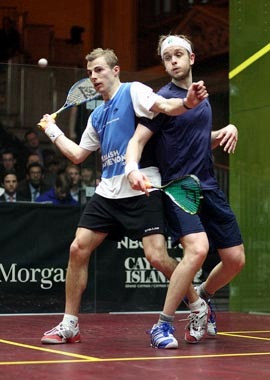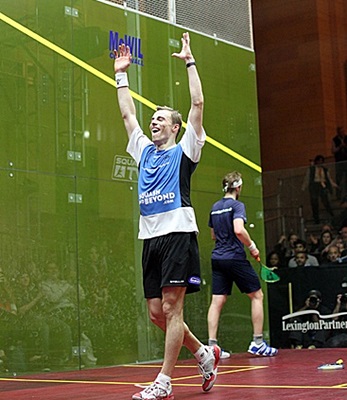ToC Finals Recap: Game-Changing Moment Leaves Willstrop Lamenting What Might Have Been
by Rob Dinerman, for DailySquashReport.com

Dateline January 28th, 2012 --- RELENTLESS. Of the various one-word characterizations of the way reigning World Open champion Nick Matthew plays squash, especially in the late rounds of important PSA tournaments, that appears to be the most encompassing. “Ferocious” and “fierce” might be equally applicable, but not “tenacious,” as that description does not go nearly far enough. Whichever term one winds up choosing to summarize the Matthew approach, never was that quality (or his other traits, like his extraordinary athleticism or exceptional and under-rated ball placement) more on display, or more necessary, than in the white-hot cauldron of Grand Central Station in mid-town Manhattan this past Thursday night, when in the final round of the J. P Morgan Tournament Of Champions, trailing British compatriot and longtime rival James Willstrop 11-8, 9-7, a stat line that properly reflects the slight but definite margin of Willstrop’s superiority to that juncture, Matthew salvaged that crucial second game with a four-point run, then controlled the second halves of the third and close-out fourth games as well to emerge with an immensely hard-fought and thoroughly captivating 8-11 11-9 11-5 11-7 victory.
Matthew thereby defeated 2010 Tournament of Champions winner Willstrop for the 13th consecutive time, displaced him from the No. 1 spot in the PSA rankings, emphatically announced his return to the competitive arena after missing the past several months with an adductor-muscle leg injury and hoisted this tournament’s gleaming trophy for the first time after three final-round losses, the most recent of which came one year ago, when he was victimized by the torrid shot-making of Ramy Ashour, the ultra-talented Egyptian who himself was prevented by a leg injury from returning to New York to defend his title.
In an anticlimactic women’s final earlier in the evening, four-time World Open finalist Natalie Grinham routed Dipika Pallikal 11-4, 3 and 3, running off 10 straight points at one stage and combining excellent mobility with severe stroke production against the rising Indian star. Pallikal has outstanding racquet skills and a substantial upside, but she was playing her ninth match in the past 10 days and, spent by her efforts during that extended time frame, had no answers for Grinham, who, sensing her opponent’s vulnerability early on, swiftly seized the initiative, which she never relinquished at any point in the 25 dominant minutes that it took for her to steamroll her way to the winner's circle.
But it is the men’s final that those hundreds of squash aficionados who jammed the arena (even the available $40 “standing” tickets were swiftly snapped up) will long remember, for its frenzied pace, consistently lengthy all-court, high-octane exchanges (six minutes and four lets elapsed before the first point of the match was recorded) and, most importantly, for the manner in which Matthew, exhaustingly but inexorably, was eventually able to impose his rock-hard will upon the competitive terrain, an even greater achievement for coming after his draining four-game semifinal win just 24 hours earlier over former British Open champion Greg Gaultier while Willstrop by contrast breezed through in three one-sided games against a physically sub-par Daryl Selby and hence had to be far fresher coming into the final.
Willstrop has visibly improved every aspect of his game, from the way he holds the ball until very late before executing the kind of dynamic and impossible-to-read wrist-flicks that flummoxed Ashour in the 2010 final, to his remarkable capacity, especially given his sizable dimensions, to get down on the ball and change directions, to the manner in which he has noticeably enhanced his fitness level. He came into the final at the top of both the PSA rankings and his formidable game, which out-did Matthew’s production during a five-point first-game burst from 5-7 to 10-7 and in the latter stages of the second as well, when he moved from 6-all to 9-7, benefiting in part from some call-reversals in his favor.
A Matthew winning drop shot narrowed the score to 9-8, leading to what turned out in retrospect to have been a match-altering moment when on the ensuing exchange Willstrop conjured up a wonderfully-disguised inside-out forehand drop shot that completely wrong-footed a backpedaling Matthew and would doubtless have given Willstrop a 10-8 lead had it not instead barely caught the very top of the tin as the enormous gallery (people massed everywhere one turned, filling all the aisles and crammed into every corner) moaned in sympathy and Matthew exhaled in relief. A two-games-to-love lead would have been almost impossible to overcome, but when Matthew then won both the next two points on stroke calls against Willstrop from the front-right, the match score was instead deadlocked at a game apiece, its personality massively transformed by the way that second game had ended.
If anything, the intensity level picked up in the third game, as did the furious battle for control of the tee, with both players fighting through each other, especially close to the left wall, and the play becoming increasingly physical, even borderline chippy, as witness one time when they became locked in center-court until each forcefully pushed the other away amid mutual glares. The pair were contesting each other for every possible bit of turf, with both players loath to retreat to the back wall, leading to rapid-fire mid-court salvos, a pulsating spectacle that fully reflected the heavyweight-championship-fight atmosphere that had pervaded the stands even before the match began. Very gradually, and in tiny increments, Matthew was able to wedge open minute fissures in Willstrop’s heretofore seamless game, exhorting himself with fist pumps and the occasional bellow in winning the final four points of the third game from 7-5, the last of them on an ill-conceived Willstrop drop shot from the back wall that had a surrender-type feel to it as it rang loudly off the tin.
That phenomenon appeared to be even more present early in the fourth game when, after dropping the first three points (seven in a row overall) before hitting a misdirection rail winner, Willstrop then lofted his subsequent lob serve well over the left-wall boundary line, a gift-point that Matthew followed with a nick winner that made the score 5-1. It is a tribute to Willstrop’s reserves that, at this ill-boding juncture and with the match swiftly slipping away from him, he was able to come up with a stirring 4-0 streak (a backhand too tight to the left wall to be returned, a rare unforced Matthew error, an overhead that Willstrop gently guided into the front-left nick, followed by a wayward Matthew drive back at himself for a stroke call) to make the score 5-all, a brand-new game.
But Matthew (who later admitted that at 5-1 he started thinking the match might be over) was able to re-focus, nudging a difficult forehand volley drop shot for a front-right winner, then accepting a stroke call against Willstrop. A Matthew tin made the score 7-6, but then, as had happened in that crucial point late in the second game, Willstrop again top-of-the-tinned a forehand drop (8-6 rather than 7-all), then hit a beautiful cross-drop, only to have Matthew dart to the ball early enough to hit an even more severely-angled cross-drop winner, followed by a smash forehand nick that gave him a 10-6 lead and match-ball. Willstrop was able to salvage the first match-ball-against with a low forehand cross-court, but on the next point, Matthew, standing in the same spot (near the right back corner) where a year earlier he had lost the final point of the 2011 final (by failing to scrape a wall-hugging Ashour serve-return back into play), this time sealed the 2012 final when he whipped a forehand drive down the right wall that cleanly passed Willstrop and died in back to give a euphoric Matthew a triumph which he jubilantly said belonged “right alongside my Worlds and Commonwealth Games gold medals as my best victories.”
In the aftermath of his defeat, a disconsolate Willstrop understandably lamented the way that second game had gotten away and asserted that to turn the recent-years winless tide of his matches with Matthew he “needs to work harder.” His rueful comments are probably an unduly harsh self-indictment, especially given how close many of those matches have been, notably their 2009 British Open final, which Willstrop was but a single point from winning. These two, along with Ashour and possibly Gaultier, are the best squash players in the world, and the quality of the squash as a whole among the PSA elite, as was demonstrated all week at this tournament, is unquestionably the highest that it has been at least in the dozen-plus years since Jahangir and Jansher Khan ruled the sport. The Matthew-Willstrop final was a fitting culmination to this milestone 15th-anniversary Grand Central Station edition of the Tournament of Champions, a riveting 85-minute epic battle in a superb promotional venue, and a fitting tribute mostly to the contestants but also to a gallery that was emotionally with the players every step of the way and a Tournament Committee led by Tournament Director John Nimick, Operations Director Melissa Winstanley and Associate Director Beth Rasin, a troika whose praiseworthy planning and organizing skills produced an absolutely magnificent event.

Back To Main
